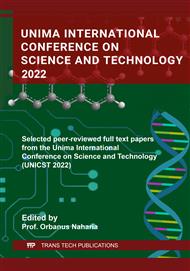p.9
p.17
p.29
p.39
p.49
p.55
p.63
p.73
p.83
Analysis of Performance Diesel Engine by Using a Mixture of Diesel Fuel and Coconut Oil
Abstract:
Ignition energy is an important key factor needed in modern life concept with regard to a high technology usage. Almost 90% of the world's energy needed is obtained from fossil fuels, where diesel fuel is one of them. Coconut oil is one of bio-diesel resources which is very potential to be developed and it has a potency to replace diesel fuel. It is, therefore research regarding the effect of diesel fuel and coconut oil mixture on engine torque and rate of fuel consumption at various RPM variations is needed to be done. The tested engine was done on a 1200 cc Isuzu Panther using a mixing ratio of diesel fuel (S) and coconut oil (MK), namely: (1). 100% S: 0% MK (pure diesel), (2). 95% S: 5% MK, (3). 90% S: 10% MK, and (4). 85% S: 15% MK. The research method was a quantitative testing method on a laboratory scale. Research finding shows that the engine torque at the 95: 5 and 100: 0 mixtures has almost the same value of almost all of engine rotations. At the 90: 10 and 85: 15 mixing ratio, the engine torque tends to be unstable significant. It can be concluded that the ideal and stable engine torques were found at the combustion of 100: 0 and 95: 5 fuel mixtures. The lowest fuel consumption rate occurred at the combustion of 100: 0 and 95: 5; while the highest fuel consumption were occurring on a mixture of 90:10 and 85:15.
Info:
Periodical:
Pages:
49-53
DOI:
Citation:
Online since:
July 2023
Keywords:
Price:
Сopyright:
© 2023 Trans Tech Publications Ltd. All Rights Reserved
Share:
Citation:


